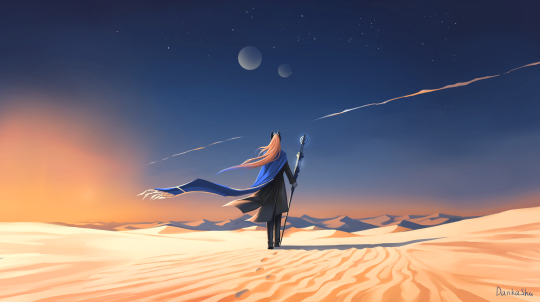Text
by far the biggest relevation in all of zwillingstürme is the fact that loving men just apparently runs in ebenholz's family
29 notes
·
View notes
Text
Very nice! Gnosis is really a stoic man hiding his true emotion under a facade. In this EP we finally get a better glimpse of his feeling...
Lyric Breakdown of "Heal The World" (part 1)
Original post on reddit.
Warning: extremely long text, excessive detail and citations, and some shippiness. Please take with a heaping spoon of salt, this is personal interpretation to the max and not gospel.
Previous essay on Gnosis’s character with some baseline assumptions and interpretations I am making.
I told myself I wasn't going to do this but here we are. On the other hand, though, I deserve it for sleeping on this song for nearly a year after its release. Let's dive in, shall we? Why does Gnosis have such a sappy and emotional image song, and what does it mean?
It's just a tear that saves me from the darkness.
Such a powerful opening line. What does the tear symbolize, what is the emotion behind it? Sorrow, grief, and pain—but pain most of all, as pain is echoed and emphasized throughout the whole song.
Witnessed through a mirror, pain is truth,
Pain and truth go hand in hand, which is a theme which is echoed throughout. It's the pain itself that keeps everything real—the pain (the tear) which saves him from total destruction; the personal anguish which experience keeps him from going off into the deep end.
Now “witnessed through a mirror”: the pain is detached and not a part of him, reflected back at him by something or someone else, and only like that does he see it. Or even, it’s the reflection that confirms it exists at all. Who is the person who is Gnosis’ mirror?
I’ll make no bones about it: the person Gnosis is addressing throughout the song is Enciodes. There’s literally, as I will demonstrate, nobody else he could be speaking to and speaking of.
So: it’s a bit of a stretch, but this could possibly be a veiled reference to their conversation as children where Enciodes says that he doesn’t believe Gnosis is at fault for the accident, but Gnosis does. This little bit of unshakable faith is one of the reasons Gnosis is so loyal to Enciodes, and during that flashback, Enciodes says, “It definitely has nothing to do with you. Nobody looks up to my father as much as you do,” almost as though he’s reflecting Gnosis’ true self back at him, showing him the reality and the truth that he committed no crime.
This is the painful truth that keeps everything real; that Gnosis carries inside of him, that saves him from the darkness: his innocence.
And through your eyes we’ll find an endless future,
During BI-3, Gnosis says to Ratatos: “[Enciodes] promised me a future.” This line is a clear reference to that. Through Enciodes’ eyes and his vision for Kjerag, an endless future, bright and dazzling, awaits.
I'll continue forward, calling to you.
This line also refers to Enciodes.
In fact, it wouldn’t be much of a stretch to argue that this entire verse refers not merely to the present moment, that is, Gnosis’s present position, but also, to the moment of his departure from Kjerag. When they parted ways, Gnosis said he would study and learn what he could to return and help Enciodes achieve their dream. In his operator file, Gnosis also comments about making “an appointment” to see Enciodes again, and returning Kjerag even if he did not appear. Though their paths are separate, they share the same goal, reflected in Gnosis’s second talent, “Two Paths, One Goal.” He continues working for the sake of their dream, while still connected to Enciodes.
This is the edge, but I continue flying.
As Gnosis goes forward, he reaches the edge. It’s a figurative cliff, with nowhere to go and only death at the bottom, but he willingly flies past this precipice on his own wings.
Leaving life around me, break away the pain.
“Leaving life” refers to Gnosis’ decision to cut himself off from the trappings of ordinary life and keep other people at arm’s length. “I am not interested in deeper emotional exchanges.” He was already ostracized before, and he embraces it, regardless of the fact that he's reached the edge—perhaps the limits of endurance or rationality or sense. He also "left life" in a more literal sense when the Edelweisses left everything they knew in Kjerag.
Then we come to the second part. “Break away.” There are three definitions of this phrase:
To separate or detach oneself, as from a group.
To move rapidly away from or ahead of a group.
To discontinue customary practice.
In my opinion, pretty much all three of these definitions apply.
To quote from Gnosis’ op file: “This isn't to say he's the kind who doesn't understand others' feelings. Precisely the opposite; he’s exceptionally clear-headed on what he wants to do, and as such he can detach himself from any other concerns. Researchers often [...] have sufficient mental energy to treat scientific principles objectively, but not necessarily enough leftover to deal with personal emotions. Thus, a good few choose to cut themselves off as thoroughly as possible. Gnosis is clearly one of these types.”
Gnosis chooses to cut off his personal emotions as much as he can in order to focus on what needs to be done. In a more literal sense, he is detached from the rest of the group. He works alone. Even his RIIC base skills reflect his solitary nature: “Precise Calculations” and “Hidden Mastermind”. Gnosis pulls the strings behind the scenes, and does things in an unconventional way.
But it’s not merely “break away” but break away the pain. This implies that his detachment and isolation is not without consequence for him. He does feel some pain doing it, but again he chooses to set it aside. It is a necessary price.
Next, this is the second time “pain” appears. The first time, it’s stated that “pain is truth”, and now the pain is broken away as if detached and set aside, perhaps concealed. The pain is what saves him from the darkness, but he hides it inside as he continues on.
I want to feel my divisions crumble down.
What’s interesting is that this line about divisions comes immediately after a line about divisions and separation. It’s almost as though, while he’s taking up this burden willingly, he’s also anticipating the day that it is no longer necessary. “Divisions” could also refer to the invisible walls which keep Gnosis ostracized and permanently branded (divided) in his homeland: that is, the false assumptions of being responsible for the deaths of Olafur and Elizabeth Silverash.
Look into my eyes and heal the world of darkness.
This line to me feels like it’s implying a silent request for reassurance. Thus far, the lyrics have been almost a series of promises, and they culminate in something that’s almost a question, asking for confirmation that they’ve been heard, especially against the backdrop of “divisions.”
The voices grow, the silence fills with screams,
Whose voices are these, and who is screaming? The people of Kjerag. This is a two-fold line: as it leads into the next line, it’s clear that it’s referring to the present day, and the impending suffering which approaches Kjerag if they continue on their current path. Other countries crushing Kjerag underfoot; the spread of oripathy; the "avalanche set to bury all of Kjerag."
But it could also refer to the events of the past. We know via the flashback and Gnosis' file that he was ostracized after the accident. Although it's never stated nor implied what his family went through before they left beyond "There's no place for us in Kjerag", it's possible that these "voices" are those of the people who shunned him. We know that people openly badmouth Gnosis and he mentions having rocks thrown at his windows. It's possible—likely, even, as I postulated before—that the Edelweisses were bullied and treated cruelly before they were forced to leave. The "voices" are the cruel words, and the "screams" are their own silent and helpless laments.
I see the twilight set on the world.
"Twilight" refers to the same vision that Enciodes and Gnosis have of the impending disaster approaching Kjerag. “They can’t see what you and I can see,” Gnosis comments during BI-6.
In addition, however, I think it could be a veiled reference to Ragnarok, that is, the "Twilight of the Gods." I say this because of the context of Ragnarok and the events which surround it. Ragnarok is the apocalypse of Norse mythology, where the Aesir (gods) have their final battle and Midgard (the earth) is destroyed. An army of the dead sails from the underworld (Helheim), led by Hela and her father Loki, finally free of his chains beneath the earth, and her brothers Fenrir and Jormungandr (the World’s Serpent) will break free of their fetters and rise from the sea respectively, and Surtr, the ruler of Muspellheim, will break the rainbow bridge Bifrost which leads to Asgard, the peaceful realm of the Aesir high above Midgard, and set fire to the world.
For millennia, the Aesir enjoy their isolated quietude and peace in Asgard, with most of their disruptions coming from their opposing force the Jotnar, symbolizing the eternal conflict of culture vs nature. But among the Aesir, their leader, part Jotunn himself, Odin, through his many sacrifices to obtain knowledge (giving up his eye for a drink of Mimir’s well of wisdom; hanging upside for nine nights on Yggdrasil, the World Tree, to gain knowledge of the runes), had the gift of clairvoyance. He looked into the future and saw Ragnarok, and decided to take action, breaking up the family of Loki and treating his monstrous children abominably in attempts to prevent it. He cast Jormungandr into the ocean, tied up Fenrir when he grew too big, and banished half-dead Hela to the edges of Niflheim to rule over the dead. In the end, none of his efforts could keep Ragnarok from happening, as the gods’ fate could not be changed.
It was not uncommon for the Aesir to walk the earth for their amusement, but Odin in particular was known for wandering incognito, listening and observing. In doing so, he obtained a perspective that the others could not. In addition, when he was young, Odin met and befriended the Jotunn Loki, whom he liked so much that they became sworn blood brothers, not genetically related but vowing to treat each other as such. Despite this, Loki was always a contentious figure in Asgard, both on account of his mischievous nature and his race. Throughout various myths, he would sometimes help (often he was the figure the Aesir would turn to whenever they had some kind of unsolvable problem) and sometimes hinder (he’d create those problems himself). By and large, though, he wasn’t considered “evil” until Christianity came to the isles (a topic not for this essay), and not until the impending catastrophe of Ragnarok drew near with the death of Baldr, Lokasenna happened, and he was imprisoned until the final battle.
Now, I’m not saying that Enciodes is meant to hearken to Odin the All-father, not exactly, nor am I saying that Gnosis is meant to parallel Loki. After all, as I said, “twilight” is a pretty broad and simple word in this context that should probably simply be taken at face value. But… I can’t help but feel there are a few similarities to Norse myth as well, despite Kjerag taking inspiration from Switzerland and Tibet, and what with Ratatos’ name being a clear reference to Ratatoskr.
Cold by nature; an isolated yet peaceful realm above everything; very few people departing its embrace yet always returning changed; children separated on false and ultimately futile premises and families broken; someone mostly helpful yet always regarded as a traitor and outsider being the catalyst for change, who was always at the right-hand of the most powerful and important figure of the nation, sworn to them in some way, and said figure being preoccupied with averting a distant disaster.
It’s also worth noting the title of the stage TC-1 (from the To Be Continued vignette), which uses the Kjerag map/enemies: “Fimbulvinteren.” This is merely a different spelling of what in English is “Fimbulwinter,” that is, the event that precedes Ragnarok, the three-year winter. As of this writing, I don’t know if it’s just flavor text or meant to foreshadow something, but if it’s been chosen as a subtle foreshadowing, it does imply more turmoil in the future for Kjerag.
I’ve been on this tangent long enough, moving on now.
It’s starting to burn…
“Starting to burn” means the first flames of total destruction have already begun; it’s getting closer. Fire, also, is the direct counter to the ice and snow which defines Kjerag geographically.
Save me... Oh, save me...!
It’s this final line that makes me feel the verse as a whole refers also to Gnosis’ past.
If it was only about Kjerag, he ought to say "save us" or "save them," but he says "save me". He wants to be saved from his own twilight. What saves him is “a tear:” someone believing in him. As the situation grows more dire, this is more important than ever.
This is the edge, we keep on falling further.
Gnosis and Enciodes' ventures keep sending them deeper and deeper into the abyss, further from light and safety and into danger, accumulating sins and doing dark deeds…
Fate intwined between us, break away the truth.
…Yet no matter how far they fall, they're in this venture together, because it's their shared dream. Their fates are linked, no success or failure without the other.
As for the second half of the line, this is the second time “break away” appears, but this time rather than cutting the pain away, Gnosis is taking the truth with him—what is this truth that is intwined between himself and Enciodes? The same thing: the truth that Gnosis is not a traitor at all, the truth that he works for good. It’s a truth that, for most of BI, only they know.
I want to see the system falling down.
The "system" being that of Kjerag, the system which keeps the country stagnant: the Tri-clan Council and the Court of Elders, and the things which keep Kjerag shackled in the past (corruption, greed, closemindedness, ignorance) and possibly even lead to situations like Gnosis' own, where his family was framed and subsequently ostracized and exiled without any concrete evidence.
Look into my eyes and heal the world of darkness.
This line is a plea against the backdrop of the previous line. “Help me make things better.” “Look into my eyes” in this line can mean anything from “make me a promise” or “give me hope” or “join forces with me”, given that the previous lines refer to falling together and fate intwined—so I feel the strongest sentiment here is “hope/promise”.
This is the fear, it brings us to the end.
This is the first instance of “the end” that appears, and with the “us” in that line, I think it’s another reference to Gnosis’ line of “They can’t see what you and I see.” The vision that they have, and the fear that they have of the impending twilight is bringing them to the brink; that is, the accelerated plans of Karlan Trade to speed up modernization.
Breaking all around you, / Feel the lies surround the broken world
Their plans—and their coup, by extension—have created a delicate web of lies and deception. Enciodes is at the center of this web, much as in BI, and because he’s the focus, the lies “break” around him. Alternatively, one can say the world breaks around him, as he’s the one instigating the change in Kjerag, breaking the status quo. Through Enciodes’s attempts to reform the world, he also opens a path for Gnosis.
that I'll continue forward.
Despite being surrounded by lies (perhaps even lies of his own making), frightened, and with the approaching end, he stays the path and keeps going. But also, this is as far as I understand (despite the slightly awkward grammar), one sentence. So it’s actually “the lies that I’ll continue forward.” Again, what is Gnosis’ big lie (of his own making)? That he’s not a traitor, he’s actually working for good. As the world around him crumbles, the lies spread that Gnosis is a traitor and now works (continues forward) to destroy Karlan Trade in revenge, when he really doesn’t.
I’ll fight for the future. Heal the world of darkness.
Self-explanatory. Gnosis works with Enciodes to achieve a better future for Kjerag and keep the twilight from burning it to ashes. He also fights to heal the darkness—that is, the "system" referred to previously. But against the last line, it adds an extra dimension to “the lies”: nobody believes Gnosis actually works for the greater good, though is partly his own fault, too: “Because he only saw the ends, means be damned, the people who worked under him, while acknowledging his talents, had many complaints. [...] Even after coming to Rhodes Island, his personality is still disliked by many operators. [...] He's also rather apathetic regarding life and morality.”
And here I am, just standing on the edge / waiting for the final days
“Final days” serves to reinforce the idea that the “twilight” mentioned above isn’t just hard times, but complete destruction. Gnosis is waiting on the edge for the end, surrounded by lies—he’s watching it coming; expectant; ready; prepared.
Ooh, can you please save me from the end? The end, the end's calling fire raging deep within
“The end” (second time) in this case has a dual meaning. The fire in this context means either conviction or anger. As the end draws near (the “twilight”), his determination to avert it grows stronger.
It's a reference to Gnosis' impatience throughout BI and how he takes matters into his own hands. I've mentioned this before, but much of the "farce" conducted during the middle of BI (when Arctoscz and Ratatos are framed) was actually a form of expertly crafted revenge: from Enciodes saying Ratatos and Arctoscz would be given a fair trial (referencing how the Edelweisses were not), to Gnosis saying to Ratatos, “Do you see how the people are looking at you?”, referencing how he and his family were treated by the public. On a certain level, the whole thing was really quite personal (which is why as I said before, Degenbrecher comments she’s never seen Gnosis so emotional).
the reason I fall
"Falling" meant in a symbolic sense, as in falling from grace and becoming sullied; an angel falling, losing its wings, and becoming a devil; in a literal sense, Gnosis is a Liberi (bird), so flying and falling metaphors come naturally. And he can safely plummet from a cliff and recover—provided his wings aren’t broken.
Notice the shift from the beginning—initially, he says he “continues flying”, but now he falls instead. He falls from grace for the sake of their dream, to prevent the approaching final days. He’s been ready to do this all along (“Let me be a traitor again.”) as “[Kjerag] didn’t accept Gnosis” and they never did, as “in an isolated environment like Kjerag, one tiny mistake can be engraved in the collective memory for generations.” He’s always been ready to fall—or perhaps he’s always been falling all along.
Take my heart and save me from the end…!
This line is two-fold. First: Gnosis may fall, but his fall—his betrayal—is false. His heart is still pure, his motives clean. Only by someone acknowledging this fact, by taking and holding onto his noble heart, is he saved from being completely condemned and consigned to doom—the second meaning of “the end” from which he desires to be saved. Willingly taking the fall; and yet still, reaching out a desperate hand at the bottom before hitting the ground.
Second, more straightforward, "Take and accept all of my feelings and save me from my fate of destruction." Again I feel this is directed towards Enciodes. Who alone has the power to do this, to decide if Gnosis lives or dies? If his fall ends in darkness or if he'll be caught at the bottom? Enciodes.
Gnosis is aware of this: “Or would you like to finish me, the traitor, and make this farce real?” At any moment, Enciodes can end him. Without Enciodes behind him, and even then, Gnosis’ position and very presence in Kjerag is shaky. If Enciodes turns his back on Gnosis, it’s all over for him. Inasmuch as Enciodes emphasizes that Gnosis will not betray him, that trust goes two ways. Gnosis is also trusting that Enciodes will not betray him, either, much as Enciodes stood by him after the accident.
Because when we fall through dreams, I'll feel the ocean
Why ocean? What does ice turn to when it melts? Water. All the stagnant ice of Kjerag melting and turning into water when their dreams are achieved. What’s more, the ice turning into water extinguishes the approaching flames of destruction. Through their dreams, the impending disaster is averted.
When the waves rise up, we’ll move beyond together.
This is, again, a reference to Gnosis and Enciodes ushering Kjerag into a new future, and through that, moving through the fire and the darkness into a new world. The waves rising up to cleanse away the stagnation and to catch them as they fall and buoy them through the turmoil of change. They fell together, and they'll rise together.
It's just a tear, that saves me from the darkness.
Witnessed through a mirror, feel the pain.
This time, the pain from the tear is palpable and tangible. It cannot be suppressed.
Once again assuming that Enciodes is the "mirror" and that he is reflecting the truth back at Gnosis, this time it’s more than an acknowledgement that the “pain is truth.” This time, it’s an acceptance of that truth, painful though it is; an acceptance to feel it, rather than break it away.
And through your cries we find an endless darkness.
"Endless darkness" is the flipside of the "endless future" and combination of that line with the "darkness" from which Gnosis is saved. But contrasting sharply with “through your eyes we’ll find an endless future,” this is “through your cries we find an endless darkness.” “Your cries”: once again, Enciodes.
One of my favorite lines from BI is this one from Enciodes at the end of what we later learn is his speech to Gnosis when they met again: "I have to make a difference. Everything I've seen has to have meaning."
Aside from the fact that I empathize heartily with the sentiment of trying to turn the chaos of the world and the things one sees into sense, this line to me is so heartfelt and reveals some of what we later learn is Enciodes’ own desperation and his feeling that he has no choice as time is running short. But how many people know this? Perhaps only Gnosis. Gnosis knows just how dearly Enciodes wants to make all of this happen. Enciodes' cries—be they of desperation, worry, fear, or pain—are silent to everyone else. Nobody really knows what goes on in his head, but Gnosis sees some of it (“Our judgments have many overlapping points.”).
So this is an acknowledgment of the darkness reflected back at him by Enciodes. The pain is shared: Enciodes has his own burdens and darkness as well. They are different, but Gnosis does not suffer alone. Though he continues forward alone, he actually isn’t. He’s found the connection he’s been looking for. It’s also another reference to the darkness of their ventures, ushered by Enciodes: his cries pave the path forward.
I'll continue forward, calling to you…
Once again, even with this knowledge of the endless darkness yawing beneath and around him, he keeps going, even with the pain reflected back at him.
What's interesting is that this shift towards a darker tone happens after the hopeful interlude of the previous verse. There’s a moment of respite, a moment of hope; then reality returns, sharp and harsh. As he falls, he sees the vision of the endless future and the melting ice and salvation—but it’s still far away. Between Gnosis’ fall and salvation—between the beginning of his endeavors and the final culmination of his efforts—is a long road of pain and struggle.
It's just a tear that saves me from the darkness, please…
This echoes the opening line. Here, it’s softer and clearer, especially against the backdrop of the previously mentioned “endless darkness.”
This time, I think the tear isn’t his own, not with the “please” at the end; this is someone else’s tear. In contrast to the quiet declaration at the beginning, this is a soft and heartfelt plea. It’s weary and fading and seeking, full of loneliness, searching for that acknowledgment and confirmation of suffering through the eyes of someone else to make it all valid.
And this last verse in particular, and the song in general, brims with this wistful feeling, melancholy yet determined, battered yet resolute. It’s at once lonely and seeking connection, while also embracing isolation and tribulation. It’s full of gloom, of searching the black sky for a star, for a glimmer of light; it’s waiting, dogged and shivering, for the long night to pass into the promised dawn; it’s flying through choking clouds for a glimpse of that clear horizon.
Mini summary included with the song:
Surveying the peaks, the crowd floods over the snowfields.
Walking the foothills, the pain feels vivid as if real.
I stay unmoved, and silently shout,
Heal the World, that comes into my view.
This is where I would like to talk about the L2D which accompanies the song. It depicts pretty much exactly the summary: the video opens up with ice frosting over a frozen bubble before it zooms in on Gnosis walking alone on the slopes of Kjerag, looking down (Kjerag is a frozen bubble itself). From the angle, he’s heading upwards, almost as though he’s approaching that cliff edge in the lyrics. We can’t really see his face, his bangs mostly shielding his expression from view, but it’s cool, neutral: unmoved. Yet still, something seems a little subdued about it, at once pensive and contemplative, as if all the thoughts reflected in the song are running through his head.
It’s not clear if he’s leaving Kjerag or arriving, though I would guess leaving, as you can see a long and winding path behind him—the last line implies Kjerag is coming into sight rather than disappearing, though the meaning stays the same: he's overlooking Kjerag from a lofty and isolated position.
The sky also gets darker as the song progresses, reflecting the slow shift in the lyrics and the heavier final verse: the sun is setting, as the light turns first orange, and behind him it turns to night. You can see two hands of what appear to be a clock spinning on his Arts unit, reflecting the passage of time, and the snowfall gets heavier as the song goes on—and Gnosis disappears with the blizzard, leaving only his Arts unit behind.
The symbolism of that, I think, is both “leaving life” and “standing on the edge.” I can’t help but picture him coming to stand on the brink for but a moment, brief yet infinite, before he goes back and picks the staff up and resumes walking. The staff alone against the snow is another symbol of isolation and perseverance.
Finally, "the pain feels vivid as if real" echoes the repeated “pain is truth” from the lyrics, and implies that the pain he feels is not a physical one but a mental or emotional one, and the silent shout is Gnosis' private wish to reform Kjerag.
Continued in Part 2.
6 notes
·
View notes
Text
break the ice stage names should’ve been BL instead of BI with the way enciodes and gnosis were acting
18 notes
·
View notes
Text
The thing about Rhine Lab/Columbia in Arknights as a stand in for america that really gets me is how it has a lot of nuance. Something that's true for Arknights writing writ large of course but it makes their potshots and criticisms of the US that much meatier and more intelligent I think.
The bit about Parvis that's an obvious potshot about nazi scientists in NASA in their early days, talking about The Ubermench directly contrasting with not only Silence arguing that science belongs to the people, but Ferdinand actually acting on it by making sure all the scientific breakthroughs Kristen is taking with her on her spaceship are documented and published.
The way Rhine Lab is entangled in military funding, the reasons why the military is so entangled with military R&D being related to their own running around unchecked and doing coups contrasting with Kristen effectively embezzling all that money to...build a spaceship and explore.
The fact that Kristen tossed aside all morals and ethics to build this spaceship and leave. The child soldier bioweapons, all of the stuff in Dorothy's Vision wrt using undocumented/lower class workers as test subjects that she signed off on. But in launching her spacecraft she quite literally tore down one of Terra's greatest lies, inspiring artists and scientists everywhere.
Idk, I feel like Hypergryph gets it in a way that like, european dev making 'Murica Simulator VR that's just a long gun violence joke won't ever get
283 notes
·
View notes
Text
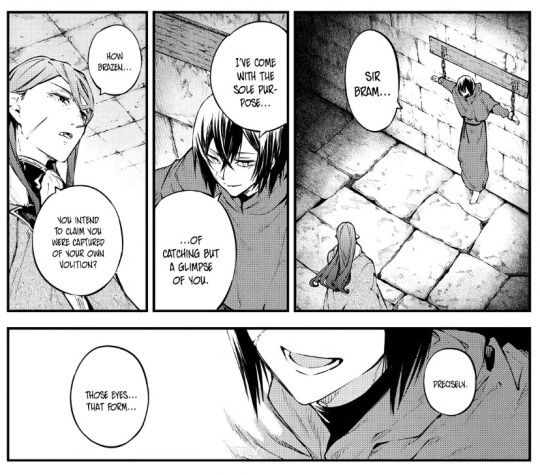
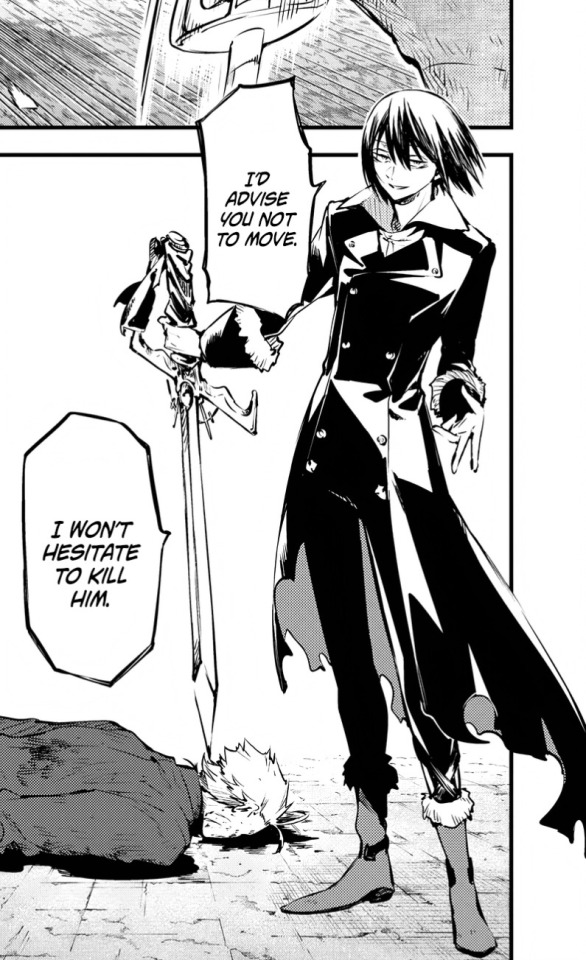
oh damn so he was just window shopping for his future body? 😔
2K notes
·
View notes
Text
It’s fine lol. After all it has so many lores.
I quite like it tho. It shows the eventual demise of a monastery where Sarkaz and Sankta got along well for 60 years. It also shows how Sankta enforcers perceive Sarkaz outside their paradise homeland.
Guide Ahead Means Something To Me
Writing about Guide Ahead is…. extremely difficult, for a few reasons. One is that it is a very dense story, and to fully unpack it would require an essay so unfocused that it would be functionally unreadable. But the biggest one is that Guide Ahead is a story that focuses really heavily on the subjective nature of interpretation. How can I speak authoritatively on the thematic meaning of the plot when even a basic description of its events demands a deeper poetic interpretation?
The answer is “I can’t.” So, let’s piss off my English teacher, and coat an entire essay in the phrase “in my opinion.” Because I have to get personal if I’m going to tell you why Guide Ahead is my favorite video game story ever told.
I was raised Mormon. My mother was religious, but my father was absolutely not. You can understand why I related to Cecilia basically immediately.
Ultimately, the thing that draws me to Guide Ahead is the very thing that makes it hard to write about. Guide Ahead is, in my reading, a story about the subjectivity of divine meaning.
The most obvious manifestation, and the most important, is Law. But, Law’s execution, in traditional Arknights fashion, is kinda unclear, so I’ll recap for those who have hobbies outside of this, unlike me.
Law is the supercomputer buried underneath Laterano, and is the sentient religion that binds all the Sankta together into a hivemind of sorts. The Sankta are actually just Sarkaz connected to Law, given halos, wings, and empathic communication between each other. But, the main thing they gain, is a biological impulse to obey the Lateran religion’s thirteen doctrines. Anyone who breaks these doctrines are marked as Fallen, are cut off from the empathic connection, and slowly revert back to Sarkaz. Law represents religion as a concept and a community. Saints and sinners are just one and the same. But despite that, the laws of religion are created just to perpetuate the existence of a special in-group. One enforced by empathic connection they cannot share with anyone outside of them. That is Patia’s point - the Sankta have created an “us” and a “them,” and even the devout Liberi are not seen as “us.” They’re just converts, not real Sankta.
But, Falling has… weird grey areas. Like how Andoain was able to shoot Lemuen, or draw his gun on the fucking Pope, and not Fall in the process. This is because the doctrines are not actually the guidelines they’re held to. The Doctrines are subjective interpretations of the objective Law that they are all beholden to. That Law being “It must survive.” Law only is interested in the perpetuation of Itself, and, as a result, the continued existence of the Sankta as a societal structure.
This is the first and strongest example of what I mean when I say Guide Ahead is about meaning. Law says that the failure of religion is ultimately that religions supplant any subjective meanings with an “objective” meaning. But this “objective” meaning is just another person’s interpretation of the in-group’s best interest. Laws biologically programmed into the Sankta’s souls are revealed to be nothing but interpretation of Law’s interpretation of events.
People Fall not because they have broken a concrete law, but because Law… because the in-group has decided they did. Or when they broke the rules, they did something that’s good for the church. There is no objective laws within the Lateran religion, no matter what the machine is named. The system just declares sin when it deems worthy, and absolution when sin is a benefit.
It is this very hypocrisy that drives Andoain.
——————————————————————————————————
I remember being pulled aside at church one day. Everyone above 14 was given a sermon about the recent legalization of gay marriage. He said it was wrong, the church would never accept it. I asked him if it was like the time the church refused to give black people the Priesthood. He said this was different. I asked him how. He did not answer. I left and someone followed me out. He asked if I was okay. I told him whatever he was saying in there was not the teachings of any god that I know, and wasn’t the teachings of any god that loves me. I kept going to church after that, but deep down, I think I didn’t believe in it anymore. I didn’t feel like part of the community, I lost that reciprocation with my people. I just… began to think.
Andoain, as an antagonist, is defined by a search for meaning. He was the bishop of an Iberian church, and Iberia is doing pretty bad lately. His request for aid from Laterano was denied, and the message was clear to him. “You are one of us, but they are not.” But that answer just created a new question. Why? Why would those who claim faith and utopia as their ideals reject those who are suffering?
He searched for an answer in exile, and he didn’t find one. Instead, he found another story. The Sarkaz man who died in the watchtower to warn a town who hated him of an invading force. And this story made his question develop. Why would someone who is hated by everyone give their life to protect those very people? And why would those people then cry over the grave of someone they hated?
He had seen the realities of the Sarkaz and Sankta laid bare, but he couldn’t figure out the meaning behind it. He tells Cecilia these stories, knowing full well he doesn’t know what to make of them. I think he tells them to hope he finds the point partway through.
——————————————————————————————————
As much as I hate the Mormon church for dear god everything they’ve ever done holy shit look at them? My feelings are predictably complicated. Years later, my family fell upon hard times. I don’t want to say more than that for my own sake. We were struggling to even live. But… the church helped us. None of us gone to church for years, but they offered a hand. They gave us access to the Bishop’s Storehouse, gave us food and supplies for free, because we were starving.
And yes, I know. I know they do this in an attempt at creating a false brotherhood in an effort to create a fascist sense of community. I have also read that part of Brothers Karamazov. I have also read Guide Ahead, come to think of it. But… Shit. Most of them tried to pretend we didn’t exist when we met them in the grocery store. And… they still helped us. In their eyes, I was Fallen.
But still, they saved us, and didn’t even ask for faith in return. I still can’t figure out why.
This is why I just… can’t see Andoain as a villain. I mean, yeah, he shot Lemuen, but even she doesn’t blame him for shooting his friends while holding the Stick That Makes You Shoot Your Friends. His entire goal is an attempt to sort through the cognitive dissonance between what the church tells him and what the church does. A dissonance that is, because of Law and the doctrines, innate to what the church is. An experience that should feel damn familiar to anyone who has spent time as an apostate. His plan is to simply confront the Pope about this hypocrisy, to get an answer, to find a meaning.
The answer he gets back is… It Must Survive. Law must survive. The in-group must survive. It doesn’t matter if we cry over the grave of the Sarkaz, because the Sarkaz would die for us. He searched for the answer to a question, the meaning of a statement. You are one of us. They are not. All this time, he searched for the meaning of those words, but in reality, those words were the meaning. That was all they ever had to say. He just needed to accept that.
…but if the in-group is all that mattered… why allow Mostima in Laterano? Why give her her position? She’s not needed for the survival of the in-group, the Law has deemed her an exile.
And… Why not Andoain?
Before he leaves, his gun is taken from him. A gun that, according to the church, has meaning. A meaning he takes as truth. He believes a part of him is left behind there. I don’t think he realizes it, but Mostima and Fiammetta are the question he left behind. They are Not Sankta, but yet they are accepted. And… I don’t know if there is a meaning to that. I still can’t figure out why.
——————————————————————————————————
For a long time, I missed those days spent in the community I had left. I would remember the things I left behind. The churchball basketball games we were destined to lose. The conversations held on the roof of the storage building behind the church. The scouting activities that were clearly an excuse to go bowling. The shitty halloween parties with the game where you ate donuts tied to a string hanging from a fishing pole. I missed it, for a time. I couldn’t help but look back.
Cecilia is searching for meaning to almost everything. When Andoain tells his stories to Cecilia, he tells her that he can’t find the meaning of them. That if there is meaning to be found, she’ll have to find it herself. So. She does.
Cecilia was faced with the same situation Andoain was obsessed with. But for her, it wasn’t hypothetical. She existed between Us and Them. She felt the pull between the community and the love and fun they represent, and the outsiders who were hated and rejected by the people around her. Society told her the meaning of her dual identity, the meaning behind each half, and then told her to choose. But… she’d experienced otherwise. She’d felt the kindness of the Sarkaz from the Pathfinders, and the hatred from the Church. She’d felt things that contradicted the meaning that she was told was true.
Her story isn’t just being forced to pick a side between the church or apostacy, it’s being forced to pick what meaning she ascribes to the world. Ultimately, that’s why her answer can only be her own. Your belief is… subjective.
And she answered… with a bell. A Sarkaz girl, bearing a halo, ringing a bell that has not been rung since the Sankta were still called Teekaz. A bell that once marked the beginning of the new era. A bell that carries the weight of a Sarkaz, hated by the place they called home. A bell that rings with the melody of a Sarkaz lullaby once sung by a Sankta. A bell that asserts her answer. She’s not Sarkaz, she’s not Sankta. She is Cecilia.
Everyone else finds their own subjective meaning within that action. Something as mundane as the ringing of the bell suddenly has more meaning than divine scripture.
No one else understood the nuance of what she said, but they understood parts of it. They understood what they wanted to. Those who know nothing of Lateran culture understand it as just… a beautiful welcome, celebrating the arrival of talks of peace. Most have their meaning determined by the church’s traditions. The pious see it as the beginning of a new era, whatever that signals to them. To the Church, it is that their talks will bring about a new era of peace. To the Pathfinders, it is a signal to begin their attack on Laterano to begin their new era.
There is so much meaning in that action, but in the end, it’s still just a fucking bell. There’s got to be hundreds, maybe thousands of them in Laterano. But this bell meant something more than the other bells. This bell had meaning, and that meaning made it divine.
This, to me, is what Guide Ahead has to say. That there is so much meaning to be found in something as mundane as a ringing bell. Within such a simple action, there is personal expression, liberation, the sound of change. And in all of this, there is the echoes of divinity, the echoes of faith, as if all of these things are, in themselves, divine.
——————————————————————————————————
When I left the church, I couldn’t help but look back, still tethered to a community who hated me. I think I wished I could stop looking back. I don't know if I realized I was.
In the end, everyone else looks back. They still have meaning to be found in Laterano. Andoain looks back, a part of his soul anchored there by the symbol he was told to believe in. Mostima looks back, knowing she’ll return just as she always does. Fiammetta looks back, because she refuses to let herself leave. Ezell looks back, unsure if he will be able to return home after what he has found.
But… Cecilia doesn’t. She has decided that she is not defined by the church, or the meaning they try to give her. She has decided to leave Laterano and see the world outside of it, to explore the world around her and find the meaning for herself.
And the last thing Cecilia does is... defined by ambiguous meaning. She sees Andoain walking in the sunset - and a word appears to her. The title of Martyr. A title she doesn’t understand the meaning or weight of, but that she feels is appropriate regardless. A title that, to other people, would mean something more. But to her, brings to mind the saints she heard of as a youth, a word her mother told her was important.
The story is ending, and they end it with an assertion. Cecilia is finding meaning, and others will find what they will within. Perhaps even she doesn't know all of it.
A while back, during a theater rehearsal, I suddenly remembered a conversation I had years before I left the church. I remembered speaking with my friends outside of the chapel after a sunday service. My friend said a sentence that has stuck with me ever since. “I don’t think science goes against God. I think God uses science and math. I think those things are holy, because they’re… what everything is made of.”
I remember looking around the rehearsal space and thinking that if science could be sacred, then… so is this moment, now. So is my time spent with the people I love. This is sacred. What I missed, what kept me looking back. It wasn’t the actual religion, but instead… just belonging to something. So… I stopped looking back. In that moment, however fleeting it was, I had found whatever it was I needed.
—————————————————————————————————
Look. You probably had a different interpretation of Guide Ahead. This story is just… So goddamn dense. There is so much there that I didn’t even touch on. For the love of god, I just did an analysis of Guide Ahead and didn’t even really discuss Fiammetta?? What kind of hack writer am I? (I just… couldn’t talk about her without being more personal than I am willing to be in public.)
If you have an interpretation that is different than mine, that’s great. I encourage you to hold on to it, and hold it close. That meaning is yours, and yours alone, and that’s a precious thing.
Because to me, what I found… is that very idea.
There is meaning to be found in anything - and a meaning that is yours, and yours alone. All you have to do is find meaning. and the idea that there is meaning to the world, that everything has meaning not because there is a “true” meaning to it, but because we find one there, because we put one there… that makes everything feel… divine, to me.
So… wherever you find meaning, you can find the divine.
You can find divinity in a ringing bell. In a terrible cactus tart. A carnival game you know how to beat. The promises of peace around a table. A cup of coffee. A city you hate. A community you love. A flower growing near a grave. A weapon you carry. A people you surround yourself with.
Those are all… holy to me.
And to me… that meaning is enough.
I hope yours is for you.
522 notes
·
View notes
Text
welcome to rhodes island, my pharmeutical company. here we want to restore equality in society and cure a terminal disease. let me present you to some of our operators
we have dorothy franks. she's a very brillant scientist and created an huge amalgam resulting from an experience using innocents lives, which almost destroyed the entire country it was in. she's really nice and kind
there we have loughshinny dublinn, they served as the leader of a terrorist revolutionary group that caused several assaults in victoria. they did not meant it
here's w. she's also a terrorist but she meant it
hey here's lappland saluzzo. her disease has rendered her completely mad and she is behind countless slaughters. i forgot why she's here
and here's ho'olheyak, she did several murder attempts on me. we can change the subject if you want
317 notes
·
View notes
Text
Mudrock's lines in ToW hit a little different now that I've read the first part of Darknights Memoir. She and her squad are like any of the mercenaries who left Kazdel behind, or who have tried to- what do they have left? What is there for them besides Kazdel? They can run, but who will take them in? What purpose do they have, those people who know only to fight?
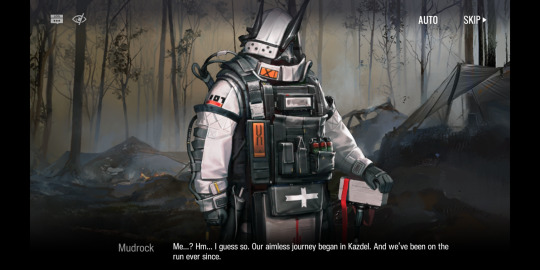
It's a literal place of course, but Hoederer talks about it in a more than literal sense. When he talks about going over the lake and leaving it behind, about wanting to leave and never return, it's about more than the place. It's their way of life, a way of war and betrayal and self-interest that keeps one alive. Mudrock's squad left on an "aimless journey", but decide to return because even if there is nothing there, there is nowhere else for them.
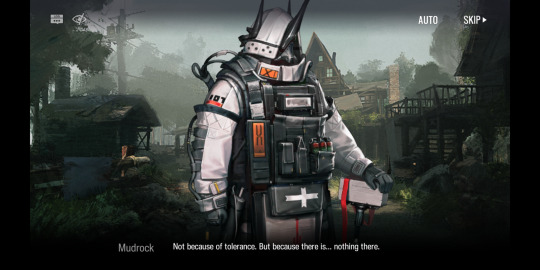
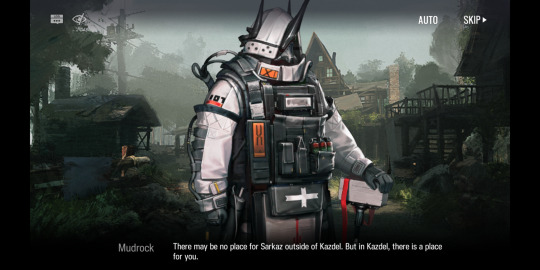
People on Terra, in general, see the Sarkaz as devils, a violent people that only bring destruction. It's not an unfounded sentiment, given the behavior of their Regent and their apparently brutal civil war. Their way of life in the years preceding the game is the way of Kazdel the nation--war.
"In Kazdel, there is a place for you
Because there is... Nothing there."
War will always be willing to take another body. Kazdel will. And even the Sarkaz that escape physically can't escape their reputation, their homeland's pull, their heritage. Meteorite's efforts to improve what people think of the Sarkaz, Warfarin and Closure's likely constant reminders that Babel was based in Kazdel and headed first by their king, Patriot's desire to know of his ancestors' homeland despite being so thoroughly Ursus in nationality that it gave him his name, Shining's sword that she carries that's stained with the blood of who knows how many of her countrymen- they will inevitably be involved, invested, reminded in some way. They can't run from being Sarkaz, they can't escape Kazdel, they can't break themselves free of being involved in war.
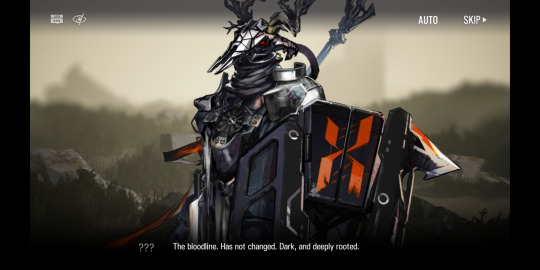
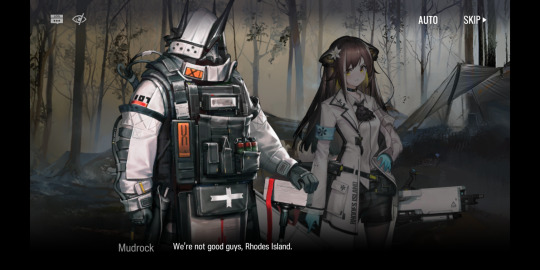
And it weighs on the ones who wish they knew how to live peacefully. They feel, whether it's at the forefront of their minds or unconsciously, whether due to their actions or due to their blood, that they only have one place they will inevitably return to.
Back to Kazdel.
Back to war.
260 notes
·
View notes
Text
Glad to know that you relate to Guiding Ahead so much? How do you find its sequel Hortus de Escapismo?
Guide Ahead Means Something To Me
Writing about Guide Ahead is…. extremely difficult, for a few reasons. One is that it is a very dense story, and to fully unpack it would require an essay so unfocused that it would be functionally unreadable. But the biggest one is that Guide Ahead is a story that focuses really heavily on the subjective nature of interpretation. How can I speak authoritatively on the thematic meaning of the plot when even a basic description of its events demands a deeper poetic interpretation?
The answer is “I can’t.” So, let’s piss off my English teacher, and coat an entire essay in the phrase “in my opinion.” Because I have to get personal if I’m going to tell you why Guide Ahead is my favorite video game story ever told.
I was raised Mormon. My mother was religious, but my father was absolutely not. You can understand why I related to Cecilia basically immediately.
Ultimately, the thing that draws me to Guide Ahead is the very thing that makes it hard to write about. Guide Ahead is, in my reading, a story about the subjectivity of divine meaning.
The most obvious manifestation, and the most important, is Law. But, Law’s execution, in traditional Arknights fashion, is kinda unclear, so I’ll recap for those who have hobbies outside of this, unlike me.
Law is the supercomputer buried underneath Laterano, and is the sentient religion that binds all the Sankta together into a hivemind of sorts. The Sankta are actually just Sarkaz connected to Law, given halos, wings, and empathic communication between each other. But, the main thing they gain, is a biological impulse to obey the Lateran religion’s thirteen doctrines. Anyone who breaks these doctrines are marked as Fallen, are cut off from the empathic connection, and slowly revert back to Sarkaz. Law represents religion as a concept and a community. Saints and sinners are just one and the same. But despite that, the laws of religion are created just to perpetuate the existence of a special in-group. One enforced by empathic connection they cannot share with anyone outside of them. That is Patia’s point - the Sankta have created an “us” and a “them,” and even the devout Liberi are not seen as “us.” They’re just converts, not real Sankta.
But, Falling has… weird grey areas. Like how Andoain was able to shoot Lemuen, or draw his gun on the fucking Pope, and not Fall in the process. This is because the doctrines are not actually the guidelines they’re held to. The Doctrines are subjective interpretations of the objective Law that they are all beholden to. That Law being “It must survive.” Law only is interested in the perpetuation of Itself, and, as a result, the continued existence of the Sankta as a societal structure.
This is the first and strongest example of what I mean when I say Guide Ahead is about meaning. Law says that the failure of religion is ultimately that religions supplant any subjective meanings with an “objective” meaning. But this “objective” meaning is just another person’s interpretation of the in-group’s best interest. Laws biologically programmed into the Sankta’s souls are revealed to be nothing but interpretation of Law’s interpretation of events.
People Fall not because they have broken a concrete law, but because Law… because the in-group has decided they did. Or when they broke the rules, they did something that’s good for the church. There is no objective laws within the Lateran religion, no matter what the machine is named. The system just declares sin when it deems worthy, and absolution when sin is a benefit.
It is this very hypocrisy that drives Andoain.
——————————————————————————————————
I remember being pulled aside at church one day. Everyone above 14 was given a sermon about the recent legalization of gay marriage. He said it was wrong, the church would never accept it. I asked him if it was like the time the church refused to give black people the Priesthood. He said this was different. I asked him how. He did not answer. I left and someone followed me out. He asked if I was okay. I told him whatever he was saying in there was not the teachings of any god that I know, and wasn’t the teachings of any god that loves me. I kept going to church after that, but deep down, I think I didn’t believe in it anymore. I didn’t feel like part of the community, I lost that reciprocation with my people. I just… began to think.
Andoain, as an antagonist, is defined by a search for meaning. He was the bishop of an Iberian church, and Iberia is doing pretty bad lately. His request for aid from Laterano was denied, and the message was clear to him. “You are one of us, but they are not.” But that answer just created a new question. Why? Why would those who claim faith and utopia as their ideals reject those who are suffering?
He searched for an answer in exile, and he didn’t find one. Instead, he found another story. The Sarkaz man who died in the watchtower to warn a town who hated him of an invading force. And this story made his question develop. Why would someone who is hated by everyone give their life to protect those very people? And why would those people then cry over the grave of someone they hated?
He had seen the realities of the Sarkaz and Sankta laid bare, but he couldn’t figure out the meaning behind it. He tells Cecilia these stories, knowing full well he doesn’t know what to make of them. I think he tells them to hope he finds the point partway through.
——————————————————————————————————
As much as I hate the Mormon church for dear god everything they’ve ever done holy shit look at them? My feelings are predictably complicated. Years later, my family fell upon hard times. I don’t want to say more than that for my own sake. We were struggling to even live. But… the church helped us. None of us gone to church for years, but they offered a hand. They gave us access to the Bishop’s Storehouse, gave us food and supplies for free, because we were starving.
And yes, I know. I know they do this in an attempt at creating a false brotherhood in an effort to create a fascist sense of community. I have also read that part of Brothers Karamazov. I have also read Guide Ahead, come to think of it. But… Shit. Most of them tried to pretend we didn’t exist when we met them in the grocery store. And… they still helped us. In their eyes, I was Fallen.
But still, they saved us, and didn’t even ask for faith in return. I still can’t figure out why.
This is why I just… can’t see Andoain as a villain. I mean, yeah, he shot Lemuen, but even she doesn’t blame him for shooting his friends while holding the Stick That Makes You Shoot Your Friends. His entire goal is an attempt to sort through the cognitive dissonance between what the church tells him and what the church does. A dissonance that is, because of Law and the doctrines, innate to what the church is. An experience that should feel damn familiar to anyone who has spent time as an apostate. His plan is to simply confront the Pope about this hypocrisy, to get an answer, to find a meaning.
The answer he gets back is… It Must Survive. Law must survive. The in-group must survive. It doesn’t matter if we cry over the grave of the Sarkaz, because the Sarkaz would die for us. He searched for the answer to a question, the meaning of a statement. You are one of us. They are not. All this time, he searched for the meaning of those words, but in reality, those words were the meaning. That was all they ever had to say. He just needed to accept that.
…but if the in-group is all that mattered… why allow Mostima in Laterano? Why give her her position? She’s not needed for the survival of the in-group, the Law has deemed her an exile.
And… Why not Andoain?
Before he leaves, his gun is taken from him. A gun that, according to the church, has meaning. A meaning he takes as truth. He believes a part of him is left behind there. I don’t think he realizes it, but Mostima and Fiammetta are the question he left behind. They are Not Sankta, but yet they are accepted. And… I don’t know if there is a meaning to that. I still can’t figure out why.
——————————————————————————————————
For a long time, I missed those days spent in the community I had left. I would remember the things I left behind. The churchball basketball games we were destined to lose. The conversations held on the roof of the storage building behind the church. The scouting activities that were clearly an excuse to go bowling. The shitty halloween parties with the game where you ate donuts tied to a string hanging from a fishing pole. I missed it, for a time. I couldn’t help but look back.
Cecilia is searching for meaning to almost everything. When Andoain tells his stories to Cecilia, he tells her that he can’t find the meaning of them. That if there is meaning to be found, she’ll have to find it herself. So. She does.
Cecilia was faced with the same situation Andoain was obsessed with. But for her, it wasn’t hypothetical. She existed between Us and Them. She felt the pull between the community and the love and fun they represent, and the outsiders who were hated and rejected by the people around her. Society told her the meaning of her dual identity, the meaning behind each half, and then told her to choose. But… she’d experienced otherwise. She’d felt the kindness of the Sarkaz from the Pathfinders, and the hatred from the Church. She’d felt things that contradicted the meaning that she was told was true.
Her story isn’t just being forced to pick a side between the church or apostacy, it’s being forced to pick what meaning she ascribes to the world. Ultimately, that’s why her answer can only be her own. Your belief is… subjective.
And she answered… with a bell. A Sarkaz girl, bearing a halo, ringing a bell that has not been rung since the Sankta were still called Teekaz. A bell that once marked the beginning of the new era. A bell that carries the weight of a Sarkaz, hated by the place they called home. A bell that rings with the melody of a Sarkaz lullaby once sung by a Sankta. A bell that asserts her answer. She’s not Sarkaz, she’s not Sankta. She is Cecilia.
Everyone else finds their own subjective meaning within that action. Something as mundane as the ringing of the bell suddenly has more meaning than divine scripture.
No one else understood the nuance of what she said, but they understood parts of it. They understood what they wanted to. Those who know nothing of Lateran culture understand it as just… a beautiful welcome, celebrating the arrival of talks of peace. Most have their meaning determined by the church’s traditions. The pious see it as the beginning of a new era, whatever that signals to them. To the Church, it is that their talks will bring about a new era of peace. To the Pathfinders, it is a signal to begin their attack on Laterano to begin their new era.
There is so much meaning in that action, but in the end, it’s still just a fucking bell. There’s got to be hundreds, maybe thousands of them in Laterano. But this bell meant something more than the other bells. This bell had meaning, and that meaning made it divine.
This, to me, is what Guide Ahead has to say. That there is so much meaning to be found in something as mundane as a ringing bell. Within such a simple action, there is personal expression, liberation, the sound of change. And in all of this, there is the echoes of divinity, the echoes of faith, as if all of these things are, in themselves, divine.
——————————————————————————————————
When I left the church, I couldn’t help but look back, still tethered to a community who hated me. I think I wished I could stop looking back. I don't know if I realized I was.
In the end, everyone else looks back. They still have meaning to be found in Laterano. Andoain looks back, a part of his soul anchored there by the symbol he was told to believe in. Mostima looks back, knowing she’ll return just as she always does. Fiammetta looks back, because she refuses to let herself leave. Ezell looks back, unsure if he will be able to return home after what he has found.
But… Cecilia doesn’t. She has decided that she is not defined by the church, or the meaning they try to give her. She has decided to leave Laterano and see the world outside of it, to explore the world around her and find the meaning for herself.
And the last thing Cecilia does is... defined by ambiguous meaning. She sees Andoain walking in the sunset - and a word appears to her. The title of Martyr. A title she doesn’t understand the meaning or weight of, but that she feels is appropriate regardless. A title that, to other people, would mean something more. But to her, brings to mind the saints she heard of as a youth, a word her mother told her was important.
The story is ending, and they end it with an assertion. Cecilia is finding meaning, and others will find what they will within. Perhaps even she doesn't know all of it.
A while back, during a theater rehearsal, I suddenly remembered a conversation I had years before I left the church. I remembered speaking with my friends outside of the chapel after a sunday service. My friend said a sentence that has stuck with me ever since. “I don’t think science goes against God. I think God uses science and math. I think those things are holy, because they’re… what everything is made of.”
I remember looking around the rehearsal space and thinking that if science could be sacred, then… so is this moment, now. So is my time spent with the people I love. This is sacred. What I missed, what kept me looking back. It wasn’t the actual religion, but instead… just belonging to something. So… I stopped looking back. In that moment, however fleeting it was, I had found whatever it was I needed.
—————————————————————————————————
Look. You probably had a different interpretation of Guide Ahead. This story is just… So goddamn dense. There is so much there that I didn’t even touch on. For the love of god, I just did an analysis of Guide Ahead and didn’t even really discuss Fiammetta?? What kind of hack writer am I? (I just… couldn’t talk about her without being more personal than I am willing to be in public.)
If you have an interpretation that is different than mine, that’s great. I encourage you to hold on to it, and hold it close. That meaning is yours, and yours alone, and that’s a precious thing.
Because to me, what I found… is that very idea.
There is meaning to be found in anything - and a meaning that is yours, and yours alone. All you have to do is find meaning. and the idea that there is meaning to the world, that everything has meaning not because there is a “true” meaning to it, but because we find one there, because we put one there… that makes everything feel… divine, to me.
So… wherever you find meaning, you can find the divine.
You can find divinity in a ringing bell. In a terrible cactus tart. A carnival game you know how to beat. The promises of peace around a table. A cup of coffee. A city you hate. A community you love. A flower growing near a grave. A weapon you carry. A people you surround yourself with.
Those are all… holy to me.
And to me… that meaning is enough.
I hope yours is for you.
522 notes
·
View notes
Text
I'm not sure if I've seen anyone mention this, but it seems to be implied in a few places that Kal'tsit was a Sarkaz and held the Sarkaz King crown during a previous life of hers.
First off, it's implied that Kal'tsit has taken on different forms and appearances in the past:


Her (first) module text suggests that she had abandoned some kingship of a nation that seems to be Kazdel.

Her module also uses the word "retrieved" to refer to the Crown, which seems to imply that she once had the crown at some point, and is considering getting it back.
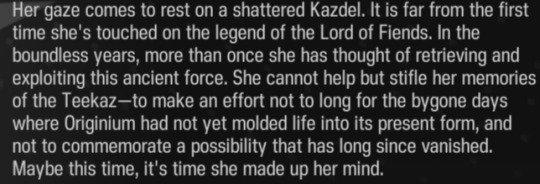
There's also this scene in 7-18. The way Kal'tsit says "so you could feel it..." seems to suggest to me that Kal'tsit probably felt it as well which is sort of weird why she would have felt it, but makes a lot more sense if Kal'tsit was the Sarkaz King in the past.

170 notes
·
View notes
Text
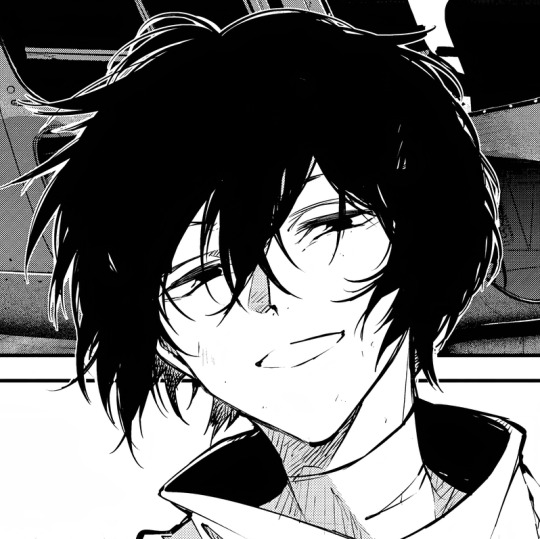
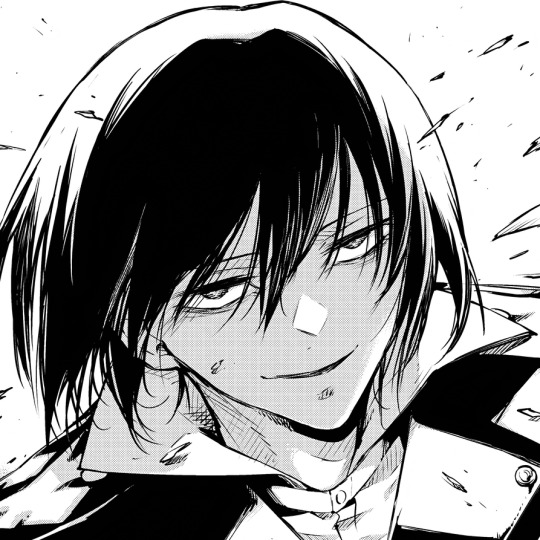
Soulmates in the way he's the only one who can kill him
328 notes
·
View notes
Text


oh damn so he was just window shopping for his future body? 😔
2K notes
·
View notes
Note
Not to mention the resultant millennia of discrimination outcasting the Sarkaz from the two reasons mentioned here: the danger of Oripathy as an entire race susceptible to the disease plus the racism against them entirely. The lingering effects of Sarkaz outlawed and outcasted from all the other countries as well as the resultant sentiments and atrocious revenges from them, are distant yet relatable discourse in this fiction with magic stone cancer.
I see conversations about people being tired of fantasy works having fantasy racism bc other than often not being handled well, the presence of it implies there is a valid reason for it kinda like how ogres are often treated as pure evil. Thinking about Arknights, I think Oripathy manages to avoid the issues? Systemic prejudices against the infected like classism, ableism, & they make statements with it all & have nuance, it's not just racism for the sake of it but real + complex issues in Terra
I understand your point but Arknights very much does have fantasy racism with the Sarkaz. It takes a backseat to general oripathy discrimination and hidden by the fact that plenty of the main cast is Sarkaz, but you have lines from Meteorite for example stating her surprise that Rhodes Island hired Sarkaz like her in public-facing jobs.
I do like though how Arknights handles the topic of racism towards the Sarkaz. They’re shown to actually be a hugely diverse group of people, they’re the minds behind the whole Rhodes Island project (Theresa, Closure, and Warfarin are all Sarkaz), and the “reason” for their discrimination isn’t because they have superpowers (fucking everyone does) or otherwise are naturally dangerous, it’s because they are simply different (everyone else represents an animal, while a Sarkaz is a mythological monster).
Fantasy racism is often eyerolling because it’s usually like “In this world the race called Normies are discriminatory towards The Exploders, a race that eats the brains of passerby and then explode. However, when this Normie cop finds a ten year old Exploder lost in his backyard, they will go on an adventure to break down the walls of society, and hopefully not explode.”
Arknights explores the topic of the Sarkaz with some nuance, and the careful explanation that the reasons they continue to be discriminated against today came about BECAUSE of their oppression. They are often mercenaries and hired muscle, because there are no other jobs for them. Many are depressed, cynical, and violent from living such a hard life where their lives are seen as expendable, further enforcing the stereotype of Sarkaz as a race of warmongers. Their only land to call their own was ravaged by foreign invasions and then by a civil war.
Even Buldrokkas'tee’s entire backstory was about Sarkaz oppression. During Theresa’s reign over Kazdel he brought his clan with him to Ursus seeking a better life for them (keep in mind Vigilo called Theresa a great war hero, implying her reign or the leadup to it was marked by war with other nations), and when they arrived in Ursus they were thrown to the frontline of a demonic invasion, made to fight horrifying and inhuman monsters to prove they were worthy of Ursus. It’s almost understandable why Buldrokkas'tee sternly told his son not to rock the boat, not to protest the Ursus government’s treatment of the infected: they had already fought so hard and sacrificed so much just to get here, just to be citizens.
It’s also why Rhodes Island as a creation of a Sarkaz venture is important to the games’ themes. Almost every single nation in Terra is a complete dystopian nightmare and yet from the most beaten, oppressed, and discriminated people comes a genuine effort to Make Things Better. Not only does RI reject the status quo of status and power by being a community effort where everyone works according to what they can do and is given according to what they need, they’re also the most advanced Oripathy research institute on the planet because of the Sarkaz’s own long intertwined history with the disease.
It’s a fantasy, in a way. “Yeah you all treated us like garbage but we’ll save you anyway while saving ourselves, fuck it. This pandemic will kill us all if we don’t.”
1K notes
·
View notes
Text
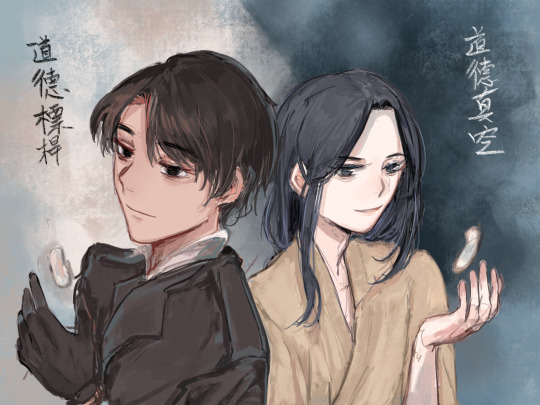
Going through RI after LOTM is an interesting experience. It’s like following a transmigrator who has very high moral standard, is a gentleman who never harms an innocent flies, to an absolute immoral villain protagonist who will make Griffith blush. Both are good tbh. I don’t get the beefs in the fandom.
13 notes
·
View notes
Text
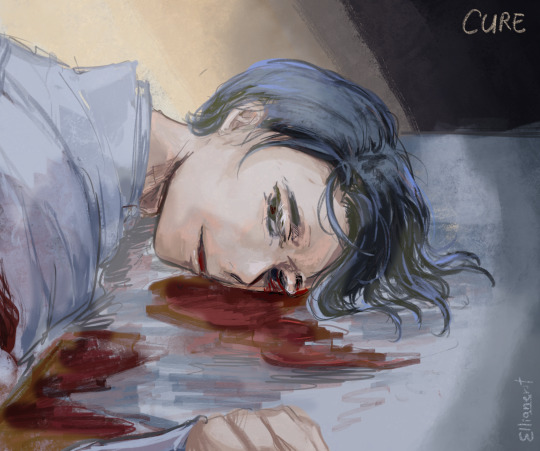
black, black sorrow
27 notes
·
View notes
Text
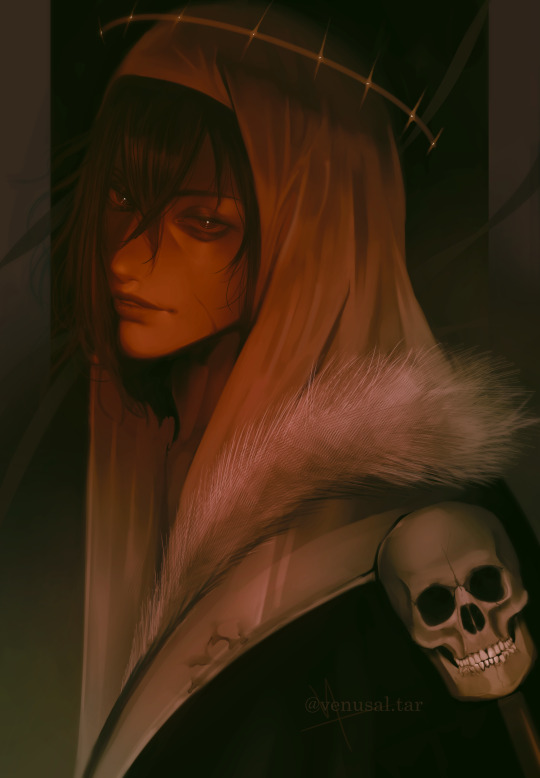
Fyodor wanderer is my new religion.
2K notes
·
View notes
